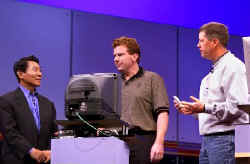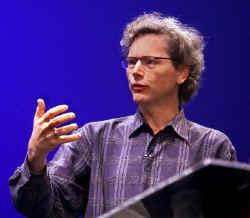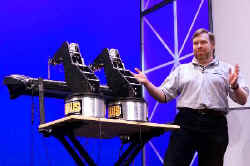New to Java? We'll help you get started with our revised beginner's tutorial, or our free online textbook.
|
|
 Get the latest Java books |
|
|
h t t p : / /w w w . j a v a c o f f e e b r e a k . c
o m /
|
||
|
Menu Articles Using Java Applets Looking for Java resources? Check out the Java Coffee Break directory! |
Exciting News from JavaOne 2000Wow! The JavaOne 2000 Developers' Conference is an amazing testament to the power and popularity of the Java platform. This year's conference saw an unprecedented number of developers flocking to the Moscone Convention Center in San Francisco. While attendance was anticipated to be over 20,000, significantly more people turned up. An estimated 25,000 Java developers visited the conference, making it the biggest JavaOne yet! This year marks a special event in the history of Java - its fifth anniversary, and over 2.5 million downloads of the Java Development Kit (JDK). Over 175 sessions on a huge range of Java topics were available, and during the conference more sessions were added. Inside the Java Pavilion, over three hundred exhibitors demonstrated the latest in Java product and services. Though the crowds made getting around the conference a little slower, it was gratifying to see the enthusiasm of fellow developers to learn more about Java. Keynotes SpeakersWhile the various technical and business sessions catered for very narrow and specific interests, the most popular part of JavaOne is the keynote presentations by industry leaders. Even several hours before the keynotes, at six in the morning, queues were fairly long outside. The first of the keynotes was delivered by Scott McNealy, Chairman and Chief Executive Officer of Sun Microsystems, Inc. Tuesday KeynotesScott McNealy is known as an enthusiastic and entertaining speaker, who likes to give "Top Ten" lists. Though not as funny as Dave Letterman, his lists are very topical and technology oriented. This year, Scott couldn't resist poking fun at Microsoft and the Department Of Justice anti-trust trial and Outlook's I-Love-You virus, with his "Top 10 new slogans proposed by the DOJ for Microsoft Outlook". Some of them were funny, others real stinkers (though this was planned, and a crashing sound accompanied them)
Scott was an interesting speaker, and covered the reasons why he believed Java had been so successful in the last five years. Safety, scalability, network connectivity, productivity, and inexpensive licensing of Java technology (after all, JDK is free, along with IDEs like NetBeans/Forte Community Edition), and the growth of the network are all contributing factors. He stressed, however, that the most important reason was the enthusiasm and passion that developers have for Java, and the sense of community that has developed.
The other major announcement from Scott was support for Java on another major platform. What's that you say? There are only three major platforms (PC, Mac, and Unix), and they're already covered? Wrong! You've forgotten gaming.
Wednesday KeynotesWednesday's keynote speakers were two of the most important Java visionaries, having contributed to and shaped the direction of Java. The first, Bill Joy, is known as the father of Jini and a strong advocate for this technology. The second, James Gosling, is heralded as the father of Java, having created the original Java language and written the Java language specification.
Bill Also talked in general about the web, and presented his "six webs" theory. His view is that there are at least six views of the web now: -
Bill Joy's vision was interesting, if not particularly Java-orientated. Java and Jini will likely control all of these webs, if Scott McNealy and Bill Joy have their way, but it was more of a vision than a reality, and very short on technical details. James Gosling, on the other hand, took a very Java-oriented approach. The main focus of his talk was on real-time Java, a very practical application in stark contrast to Bill Joy's talk.
SummaryJava developers have a lot to be excited about this year. With a slew of new and exciting announcements about Java, there are plenty of opportunities for developers out there to "cash-in" on the Java wave. Scott McNealy emphasized in his keynote address that new Java startups are placed to win big, and that Java was a profitable business. While the managers, analysts, and business gurus will no doubt be excited at this prospect, for the average developer the most important thing to come across from McNealy's talk is the support of Java on major new platforms, from the Macintosh and Dreamcast, to the humble credit card. While Bill Joy and James Gosling's talks were not, perhaps, as exciting, they were nonetheless inspiring in their outlook for the future of technology and Java.About the AuthorDavid Reilly is a software engineer and freelance technical writer living in Australia. A Sun Certified Java 1.1 Programmer, his research interests include the Java programming language, networking & distributed systems, and software agents. He can be reached via e-mail at java@davidreilly.com or his personal Web site.
|
|||||
|
||||||






